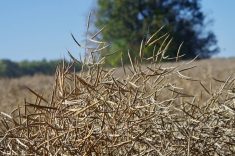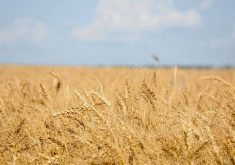A national nursery industry group will take over the rights to various genetics from Agriculture and Agri-Food Canada’s ornamental breeding programs, including its signature rose series.
The Canadian Nursery Landscape Association, working with Ontario’s Vineland Research and Innovation Centre, announced Thursday it has taken over the breeding, selection and marketing rights made available by AAFC in a request for proposals in May 2009.
The CNLA, based at Milton, Ont. in the Greater Toronto Area, is a non-profit federation of nine provincial associations with over 3,600 members in the landscape, retail garden centre and nursery sectors.
Read Also

Feed Grain Weekly: Corn affecting barley prices in Lethbridge
Corn imports entering Lethbridge have lowered prices for feed barley compared to those in Edmonton.
The federal agriculture department for years has operated ornamental breeding programs at its Morden, Man. and St-Jean-sue-Richelieu, Que. research stations, producing plant varieties for Canadian conditions such as the well-known and prairie-hardy Explorer and Parkland roses.
“The transfer of genetic material from AAFC to CNLA is an important milestone for industry putting us squarely in charge of our own plant ornamental breeding program,” said Michel Touchette, research chair for the CNLA and sales manager for Jeffries Nurseries at Portage la Prairie, Man.
The agreement, he said in a Vineland release, gives the Canadian wholesale industry access to “important genetic material that has been developed by AAFC researchers. In addition, royalty fees paid by nursery growers on new plant varieties previously introduced by AAFC will be re-invested by the CNLA into the development of new plant varieties.”
As a trade association, CNLA “never” intended to get directly involved in plant breeding research, Touchette said. Vineland, a not-for-profit horticulture research centre in Ontario’s Niagara region, will serve as “a long-term partner of CNLA heading up our research and innovation objectives.”
Rose genetic materials have already been transferred to Vineland’s facilities at Vineland Station, Ont., west of Niagara Falls, and research has already started, the CNLA said.
Vineland CEO Jim Brandle said the work “complements a suite of research programs we are leading for the nursery and landscape industry in Canada. With the hardy rose program in particular we see opportunity in bringing the beauty of roses to less-than-ideal growing climates around the world.”
The agreement between AAFC and CNLA “resulted from extensive industry consultations that clearly identified the importance of plant genetic material developed by federal researchers over many years,” the association said.
AAFC’s May 2009 request for proposals sought companies “with interests to further develop existing germplasm and commercialize new ornamental cultivars,” including its hardy roses, woody plants and monarda, a perennial better known as Bee-Balm.
The department said it would evaluate proposals based on their breeding, production and marketing strategies as well as marketing experience and financial capacity.
CNLA said Thursday it has also partnered with the Canadian Ornamental Plant Foundation to monitor and collect royalties on present and future new varieties, as “the reinvestment of royalties is critical to a sustainable ornamentals’ breeding program.”















